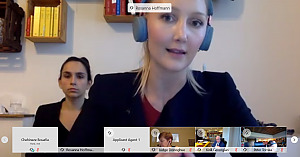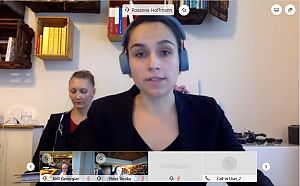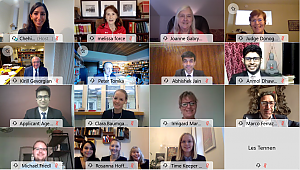Vice world champion! A look inside this years Manfred Lachs Space Law Moot Court

The Manfred Lachs Space Law Moot Court is a public international law student competition, which is organized annually by the International Institute of Space Law (IISL). Katharina Harreiter, Rosanna Hoffmann und Hristina Talkova represented the University of Vienna as part of the team for this year's competition. We were notably successful and managed to win the European Regional Rounds and thereby secured a place at the International Rounds. After winning the Semi-Final we proceeded to the World Finals, where we were awarded runner-up, the Eilene Galloway Award for Best Memorials and where Hristina Talkova won the Sterns and Tennen Award for Best Oralist.
Our team was coached by Mag. Clara Baumgartner and Mag. Michael Friedl. Both had competed in the Space Law Moot Court in the past and started coaching afterwards. This year they coached the team within the framework of a joint course as university research assistants and doctoral candidates. The University of Vienna has participated in this competition since 2012 at the initiative of ao. Univ.-Prof. Mag. Dr. Irmgard Marboe from the Section for International Law and International Relations.

The preparation for the competition included the litigation of a fictional case in front of the International Court of Justice and is roughly split into two phases – preparing our written submissions and preparing for the oral arguments. During the written phase, we worked on two memorials – one for the applicant and one for the respondent – which we submitted at the end of February 2020 to the European Centre for Space Law (ECSL) in Paris. The European Regional Rounds would have taken place at the University of Vienna at the beginning of April. However, due to the Covid-19 pandemic, the in-person competition was cancelled and it was held online.
Therefore, it was decided that the teams which had achieved the four highest memorial scores should participate in the Semi-Finals online. We were pleasantly surprised to be among the teams that advanced to the European Semi-Finals, after our memorials had been assessed and graded by space law experts. Our team started preparing for the oral rounds immediately and due to the pandemic, we could only practice online, which of course demanded a big adjustment from how we had conducted our work during the preparation for the written submissions. We managed to adapt quickly, but we did miss working closely with one another.
The European Semi-Finals were organized by the ECSL in collaboration with the University of Vienna and took place at the beginning of June. We managed to advance to the European Final after a Semi-Final with strong opponents from the National and Kapodistrian University of Athens (Greece). We managed to win the Final against the team from the University of Leiden (The Netherlands) and were declared European Regional Winners. Hristina Talkova also won the award for Best Oralist for her participation in the European Rounds.

We did not have time to rest for long however, as we immediately started preparing for the International Rounds of the competition. Before the World Rounds, each team had time to modify their memorials before submitting them to the IISL in August. Simultaneously, we also started preparing our oral arguments. At the end of September, our team competed against the team from the University of Pretoria (South Africa) and managed to advance to the World Final. The World Final took place on the 23 October where our team was up against the National Law University Delhi (India). Despite both teams presenting their respective side at the highest professional level, the actual Judges from the International Court of Justice, Peter Tomka (Slovakia, President), Joan Donoghue (USA) and Kirill Gevorgian (Russia) declared this year's winner to be the team from the National Law University Delhi. Our team was awarded the Eilene Galloway Award for the Best Memorials. Hristina Talkova was also awarded the Sterns and Tennen Award for Best Oralist.
We might not have won the World Final, but this year's edition of the competition was the most successful for the University of Vienna so far. We still consider the last 12 months as being one the most informative and most enjoyable times of our academic careers so far. We were able to gain experience in academic writing and research, as well as oral advocacy. However, all the awards we managed to win are surely not the most important achievement to us, as the Moot Court allowed us to find hopefully long lasting friendships.
